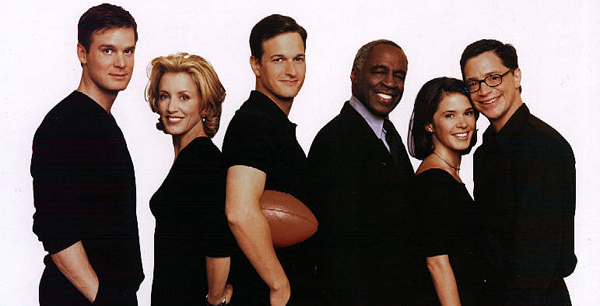I read a review the other day where the opening line praised a particular drama for being unlike anything else on television. And then the second line said it was a remake of a French TV show.
I’m not going to say that it is this kind of review that makes me mentally downgrade television critics, but if you wanted to think that right now, I wouldn’t object. I remember giving up reading a particularly famous reviewer because after months of repeatedly despairing that there was nothing new on television, ripped apart a show for being different.
Anyway.
Lately I seem to have been reading more reviews where there are what, to me, seem equally ridiculous claims. Most often it’s this: such and such a show is terrible, but this or that actor is great in it.
You cannot separate an actor from the writing or the direction or, I offer, anything else in a production. An actor does not come in and make up their own lines. Writers do not write dreadfully for every character bar one. The director did not tell one actor the piece is a serious historical crime drama and leave the rest thinking it’s farce.
Certainly, unquestionably, some actors are far better than others and certainly one actor may be more right for a particular role than another. I love that only in this circumstance can you genuinely have gradations of right. This actor is more right than this one.
But back to the point. You cannot separate an actor’s performance from the character they are playing. Not from the role, not from the script, not from direction. Every single element of a drama is working together –– or not –– as a whole and none of it can be separated out.
Except the script. You can read the script without any director or cast. Er, also costume design, now I think about it. Considering how badly I dress, it’s remarkable how interesting I think costuming is. A highlight of Strictly Come Dancing for me is the Thursday slot on It Takes Two when designer Vicky Gill talks about costumes. The sheer artistry of the pen sketches she and her team makes, the artwork that is thrown away because it is a step on the route to the final costume instead of a piece of work itself. That reminds me a lot of scripts: they are tools to get you to the finishing line, the production. That they’re amazing on the page is a bonus that few people, compared to the millions viewing, will ever see or even care to see.
I just like how you can look at costumes out of context and you can read scripts by themselves too. But all of this is on my mind today because this week I bought two TV series and in context, both of them have the wrong music.
It turns out that this is something else you can separate from a show: its soundtrack. I should realise that as I used to have an awful lot of soundtrack albums back when there were albums.
I hope I have realised before that music can be enjoyed without the rest of the show. But I am certain I never realised how music is about the only element that can be changed after the fact.
And often is.
Intellectually, I knew for instance that WKRP in Cincinnati had problems with the music used in the show’s radio station setting, and I gathered that the DVD replaced them. But now I’ve bought the second season of Sports Night and I did so in part because the opening of that season begins with track that’s become a favourite. She Will Have Her Way, by Neil Finn, is an unusual choice for the start of a sitcom and it plays out over a very extended sequence. It’s played out very well, so well that I started that episode just to hear it and to see how perfectly it fits.
It perfectly fit alright, but it also perfectly came out again. On the version of Sports Night that you can buy in the US iTunes Store, that song has been replaced entirely by a track called Valentine by Tim Cullen. It’s mostly played over a montage but there are points when those scenes are audible, so this isn’t just someone playing the track loudly, it’s the episode’s audio remixed to remove one track and insert another.
You know that took effort, I imagine it took care. But, sorry Tim Cullen and whoever did this edit, it’s wrong. I’ve remembered the right track for 20 years now and I was actually a little crestfallen that something I think worked so well was now altered.
And then the UK iTunes Store only went and had a sale on the original Magnum, pi. I could talk to you about that show for several hours longer than you’d put with, but forget television history, it’s just a very good series.
If you know it, you have the theme in your head at this moment and may even know that it’s by Mike Post and Pete Carpenter. What you are less likely to know is that the theme you’ll have for the rest of today is not the original theme to the show. The original, by the same writers, is just a bit ordinary, a bit flat, compared to what you know. The tune you know was incidental music, possibly end titles music, and it was so for the first several episodes.
Changing it to make it the main theme back in 1981 was a good move and I truly believe helped become a show a hit on the air. Changing it in 2018 when it went onto iTunes, well… unfortunately I’m afraid I think that was a good idea too. I wish I didn’t, I feel my entire point evaporating in front of you.
But there it is. The iTunes digital release has been edited to put the famous theme tune on the start of even the pilot.
You can’t rewrite the past. But you can re-score it. So of all the elements of a drama that can exist outside that drama, the script and the costumes can have a kind of life of their own. But only the music can be replaced later.

